|
SPAUGH - PATTERSON FAMILY
(Contributed by
Daniel Terzo, Jr.)
Subject: Ancestral
Home of the Patterson Family The following picture is
of the "Old Patterson Homestead" in 1905.
It was also known as the Cedar Dale Farm. The
Patterson family were early settlers in Sullivan. They came to
Sullivan in 1832 and established a land grant. The house was
built in 1853 by Donty Patterson. The people pictured
are: Perry Patterson, who was Donty's youngest son, Perry's wife
Gertrude Lyon Patterson, and their daughter, who is Nellie Patterson
Spaugh, the maternal grandmother of Daniel Terzo, Jr. (Our
contributor) The house was of solid brick, with walls
20" thick. It was struck by lightning in 1948 and was destroyed.
The farm still belongs to the descendants of the Patterson family.
Where the house once stood is 20 acres of farmland, surrounded now by
homes. Few people in Sullivan realize what once stood there.
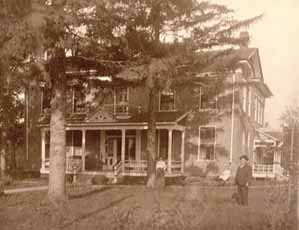

This next picture is of the Hinton School which was located in
Allenville, Moultrie County.
It was taken in 1910. My grandfather, Ray Spaugh is the boy standing
in the back row, 3rd from the right. The teacher Edith Brant is in the
back row far right. My grandfather was raised on a farm in Allenville.
The Spaugh family were early settlers there.
He, my grandfather, went thru Moultrie County schools, attended the
University of Illinois and majored in English. He taught school in
Moultrie County at the Hinton School and the Crabapple School. He
married Nellie Patterson in 1920, and moved to California in 1922.
He attended USC and got his Masters Degree. He taught every grade from
a one room schoolhouse, up to and including a University.
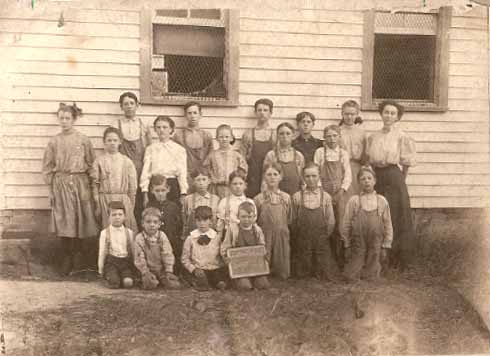
Pictured above are as follows:
Back Row, left to right: Mabel Ethington, Chester Graham,
Spencer Graham, Vey Osborn, Ray Spaugh, Charlotte Winter & Edith
Brant, Teacher.
Middle Row: Valerie Winter, Freda Shirey, Molly Winter,
Otis Goddard, Melvin Wiley
Sitting: James Winter, Arthur Ethington, Claude Shirey,
Clem Goddard, Ralph Peters, Merrill Waddell
Front Row: Russell Shirey, Clurie Burnett, Arlie Graham,
Mick Ethington

The second picture is of my grandparents, Ray Spaugh and Nellie
Patterson, dressed as "Old Folks" for a parade around the Sullivan
Square in 1916.
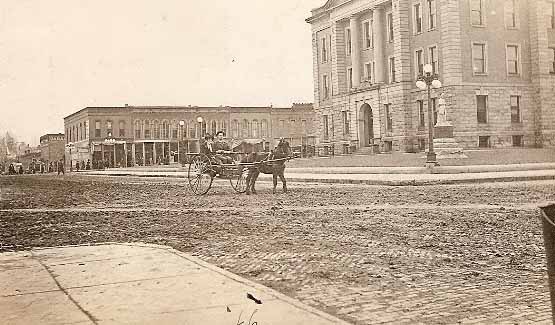

The third photo is of a Patterson Family picnic probably in the late
1880's.
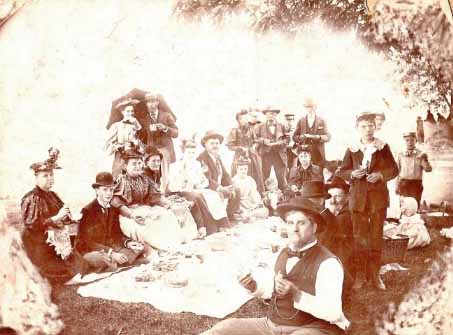

The next photograph was taken Dec 20,1913. My Great Grandfather, Perry
Patterson, was a farmer in Sullivan.
His farm, CedarDale Farm was at the southeast side of Sullivan.
He was a well known hog farmer. The picture shows his "cement" hog
trough. To the right of the picture, you will notice steam. He fed his
hogs heated slop!
The cement hog trough is the only remains of Cedar Dale Farm. It is on
a pasture on the east side of Patterson Rd.
My family and I ,when we visit Sullivan, host wine and cheese parties
on the hog trough! It was even the sight of my brother and his wife's
renewal ceremony, celebrating their fifteenth wedding anniversary.
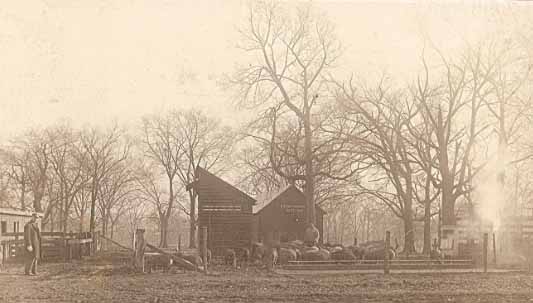

The newspaper article was in the Decatur Review paper. It tells
how he would feed his hogs high priced corn, and how much more he
realized when the hogs went to market.
The news article is a little hard to read but reads as follows:
|
IT PAYS TO FEED
HOGS COSTLY CORN
-----
Perry J. Patterson Realizes $1.14 a Bushel
Sullivan, Dec. 24 - Perry J. Patterson, owner of teh Cedar
Dale Farm which is located at the edge of this city, has been
asked to answer this question: "Does it pay to feed hogs
this high priced corn?"
As an experienced stock raiser Mr. Patterson hs kindly
consented to give his opinion along this line and this is what
he has to day.
"Does it pay to feed this high priced corn to hogs, is
a question often asked and here are some figures to prove that
it does pay. On June 26, 1913, I bought thirty-eight pigs
that weighed thirty-one pounds each and on July 16 I bought
twelve that averaged thirty-seven pounds each and on Aug. 16(?),
I bought twenty-five head that averaged thirty-eight pounds
each. I fed them just enough to keep them growing until
Oct. 1 then I began to increase the feed until I got them upon
full feed. On Oct. 25, they weighted 107 pounds each.
I continued to give them all they could eat and drink until Dec.
22, fifty-seven days after purchasing them, when I sold them.
Their average weight was 205 1/2 pounds.
"They had eaten 200 bushels of old corn and 570 bushels
of new corn, a total of 770 bushels of corn. I also used
2,000 pounds of shorts in making slop at a cost of $29 they had
all they could eat and drink twice each day. The water was
furnished them from my compressed air water system which is
piped in all feed lots. They were fed on a concrete
platform 12 x 36 feet.
The total cost of the seventy-five pigs was $250.60 or
8 3/4 cents a pound and I sold them for 7 1/2 cents a pound and
received $1,157.
"By just a little figuring you can see that the corn
brought me 1.14 a bushel. |
The copy is below:
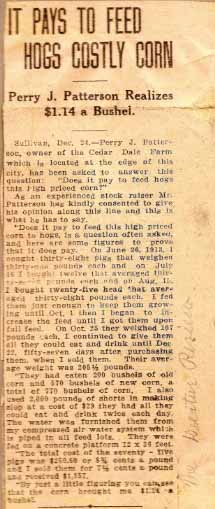

NEXT |
![]()
![]()
![]()






